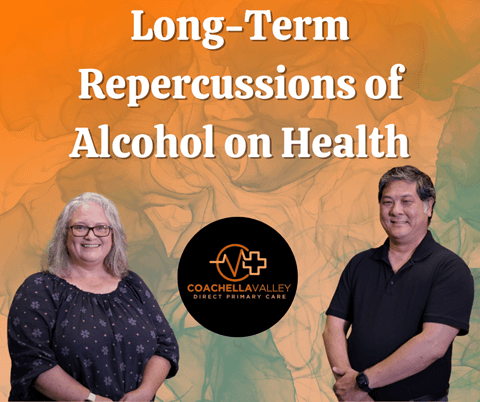Let’s cut to the chase. Drinking alcohol is a bit like taking a rollercoaster ride through your body. You hop on, maybe feeling tense or stressed, and soon enough you’re coasting at the top with that buzz of relaxation. But what happens next isn’t always fun—the drop can be steep.
Today we’ll unpack how effects of alcohol on the body play out from head to toe—starting with those temporary highs right down to some serious long-term consequences for heavy drinkers.
You’ll get why mixing booze and decision-making often spells trouble, see how “just one more” could push your liver too far, and learn when drinking crosses from moderate into risky territory. This isn’t just another lecture about health; it’s knowledge that might just change how you drink.
Frustration-free health care for the whole family. A monthly membership program designed for the busy Coachella Valley family to give you direct access to primary healthcare services so you can be healthy and active. Schedule a free consultation. 760-642-5549
Table Of Contents:
- The Immediate Impact of Alcohol on Your Body
- Long-Term Repercussions of Alcohol on Health
- Defining Moderate vs. Heavy Drinking
- Alcohol’s Influence on Mental Health and Social Behavior
- Conclusion
The Immediate Impact of Alcohol on Your Body
You’re out with friends, enjoying a drink. It starts with that warm buzz as alcohol begins to affect your body. But what’s really going on inside? From the first sip, alcohol sets off a cascade of reactions in your system.
From Euphoria to Nausea: The Rollercoaster of Binge Drinking
Binge drinking can feel like being strapped into an emotional rollercoaster. Initially, there’s euphoria and relaxation but soon enough, it can spiral down to nausea and headaches. When people binge drink, they experience short-term effects such as lowered inhibitions leading them from laughter to potentially regrettable decisions or slurred speech; it’s no wonder why one minute you’re feeling top-notch and the next you wish for nothing more than a bed.
In moments where we lose track of our drinks at events or parties, blood alcohol concentration spikes. This increase is not just about getting dizzy—it also compromises motor skills and cognitive functions which might explain those dance moves nobody will let you forget.
Blood Alcohol Levels and Behavior Changes
You’ve probably noticed how different amounts of alcohol can change someone’s behavior drastically—that’s all thanks to varying levels of blood alcohol content (BAC). A couple of drinks may make someone chatty while too many could lead them into risky situations because their judgment gets clouded. As BAC rises so does impairment; coordination becomes clumsy leading sometimes even simple tasks to become challenging feats worthy of applause when accomplished under the influence.
Alcohol affects each person uniquely but understanding these changes helps us keep check on ourselves before things go south fast. We need to be mindful that even if someone appears okay after several rounds they might still struggle internally balancing their emotions due to physical alterations happening within due the intake of liquid courage known as alcoholic beverages.
Dehydration and Hangover Symptoms
We often overlook the effects of dehydration, only to wake up parched after a night indulging in libations and realize that water should have been our best friend throughout the evening. Dehydration sneaks up on us, diminishing our ability to think clearly and causing pounding headaches, dry mouth, and general malaise. These are the delayed hangover symptoms kicking in, reminding us that nights spent over glasses weren’t without consequence.
Rethinking drinking habits, especially when experiencing regular post-drink woes, makes sense since hydration plays a crucial role in managing the overall health impact of casual imbibing. Not to mention research has linked excessive long-term use to serious conditions like hepatitis fibrosis cirrhosis thus emphasizing the importance of moderation.
Key Takeaway:
Drinking alcohol starts with a buzz but can quickly turn into a rollercoaster of emotions and impaired motor skills. Be mindful, because even if you seem fine, your body may be struggling. And don’t forget to drink water—dehydration leads to hangovers that’ll remind you the next day.
Long-Term Repercussions of Alcohol on Health

When you drink alcohol, it’s like throwing a party in your body where the long-term guests can cause quite a ruckus. Over time, this rowdy crowd can lead to chronic health issues and diseases that aren’t so easy to kick out.
Brain Health and Cognitive Decline
Sipping on alcoholic beverages might seem harmless enough at happy hour, but regular consumption is no friend to brain health. The more you invite alcohol into your life, the more likely it is that cognitive functions will start slipping away. Picture your brain’s communication pathways as bustling highways; now imagine them getting littered with detour signs thanks to moderate or heavy drinking habits over the years. Statistics show that these disruptions have real consequences: weakened immune systems and negative impacts on our mental command centers are just some of the uninvited outcomes.
The effects don’t stop there—alcohol abuse has been tied directly to troubles with memory retention and problem-solving skills. It’s not surprising when you think about how booze bombards those crucial areas in our skulls responsible for keeping us sharp as tacks.
Liver Disease Progression from Alcohol Misuse
Your liver is basically the bouncer of your body – deciding what gets through and what doesn’t. But consistent rounds with excessive alcohol intake turn this velvet-rope guardian into an overwhelmed mess struggling against invaders like fatty liver disease which can march forward toward hepatitis fibrosis cirrhosis if left unchecked by healthy lifestyle choices or medical intervention provided by professionals such as those at Coachella ValleyDirect Primary Care who understand personalized care paths for their patients.
Fatty liver may sound somewhat benign—a little extra padding never hurt anyone right? Wrong. This initial stage often leads down a dark path toward scarring (fibrosis), full-blown inflammation (hepatitis), and potentially fatal damage (cirrhosis). By understanding these stages early, we give ourselves fighting chances against escalating risks that could otherwise be missed until too late.
Alcohol’s Link to Increased Cancer Risk
If only cells reacted to carcinogens like humans do smoke alarms—running out at first whiff—but sadly they don’t always get fair warning before harmful substances from drink increase cancer risk across various types including breast cancer, colorectal cancer, esophageal cancer, oral cavity cancers, even ones less talked about yet equally menacing such as liver cancer—all scary reminders why moderation isn’t just good advice; it’s essential for maintaining our health. Watching what we consume can play a big role in preventing these diseases and keeping us safer in the long run.
Key Takeaway:
Drinking too much over time can mess with your brain and liver, leading to serious health problems like cognitive decline and liver disease. It’s not just about hangovers; it’s about long-term risks that sneak up on you.
Booze isn’t just bad for your weekend plans—it increases the risk of various cancers. Moderation is key because what you drink now could lead to major health issues down the road.
Defining Moderate vs. Heavy Drinking
It’s a casual Tuesday night and you’re unwinding with a glass of wine, or maybe two for the gents—sounds moderate enough, right? But where do we draw the line before one more drink tips the scales into heavy drinking territory?
Guidelines for Safe Alcohol Intake
The Dietary Guidelines offer us some clear boundaries. For women, keeping it to 1 drink per day slides into what’s considered safe alcohol intake; men get a bit more leeway at 2 drinks daily. And just so we’re on the same page, when I say ‘drink’, think 12 ounces of beer, 5 ounces of wine, or 1.5 ounces of distilled spirits—that’s your standard unit.
If you like numbers better than words—and who doesn’t love good stats—they tell us that sticking within these limits can be part of an overall healthy lifestyle if you choose to drink alcohol. Yet stepping over these lines even occasionally nudges you closer to heavy drinking which is no friend to longevity or quality life.
The Slippery Slope from Moderate to Heavy Drinking

Moderate turns heavy faster than most people expect—a couple extra rounds here and there and suddenly your liver’s working overtime while health risks pile up unseen. A night out might start with lowered inhibitions, but as those drinks add up so does your blood alcohol concentration leading down paths nobody plans on taking such as mixing in risky decisions with their cocktail mixers.
Surely none among us sets sail aiming for Hepatitis Fibrosis Cirrhosis yet persistent heavy drinkers often find themselves docked at exactly that unfortunate destination—or facing other sobering consequences like increased risk factors for various cancers including breast cancer, colorectal cancer, esophageal cancer, and not forgetting liver cancer too.We haven’t even touched upon how chronic misuse could invite cognitive decline making socializing feel less ‘Happy Hour’ and more ‘Puzzled Minutes.’ Recognize any warning signs early because let me tell you prevention beats cure every time especially when it comes down to fighting off potential diseases caused by excessive tippling.
Knowing whether you’re sipping safely or teetering towards trouble isn’t always straightforward but understanding what constitutes moderate versus heavy drinking is key in making informed choices about consumption.
Key Takeaway:
Understanding what’s moderate versus heavy drinking is crucial. Women should stick to one drink a day, men two. But watch out—going over these limits can quickly turn a casual sip into a risky habit with serious health consequences.
Moderate drinking can slide into heavy without much warning. Stay within the guidelines to keep it safe and your liver happy, avoiding that slippery slope toward major health issues like cancer or cognitive decline.
Alcohol’s Influence on Mental Health and Social Behavior
Many of us know that drinking alcohol can lead to a night of laughter or one too many embarrassing dance moves. But it’s not just about what happens at the party. Alcohol has a sneaky way of messing with our minds and how we interact with others, often in ways we don’t expect.
Lowered Inhibitions and Risky Decisions
The first sip might make you feel like you’re on top of the world, but as your blood alcohol level rises, so does your tendency to take risks you’d usually avoid like texting an ex or climbing onto a table for an impromptu karaoke session. Research by the National Institute on Alcohol Abuse and Alcoholism (NIAAA) suggests even moderate drinking can fog up brain health over time. This isn’t just about waking up with regret; it’s also about how these moments stack up long term.
Sure, most people think they drink responsibly enough not to let their guard down completely—until they do. What starts as loosening up at happy hour could end in decisions that throw caution—and sometimes consequences—to the wind.
Mental Health Takes a Hit With Every Sip
We’ve all heard someone say they drink to forget or unwind after a stressful day. But leaning on alcoholic beverages this way is akin to putting duct tape over a leaky pipe—it doesn’t fix anything long-term; it only masks problems temporarily. Studies link heavy drinking patterns directly to mental health struggles such as depression and anxiety disorders—not exactly something anyone wants added to their cocktail mix.
Mayo Clinic experts note that consistent alcohol consumption might offer momentary calmness but could brew stormier moods later when sobering reality hits again—potentially creating vicious cycles hard to break free from without professional help from healthcare providers.
Navigating Social Labyrinths While Tipsy?
You’d think being tipsy would turn every social interaction into smooth sailing—but think again. It’s true: A glass or two might grease those social wheels initially because everyone loves an entertaining storyteller at gatherings right? However, keep pouring, and soon enough those charming anecdotes become slurred words nobody follows anymore—including yourself possibly forgetting whom you’ve told what.
It’s important to recognize when alcohol starts impacting your social life negatively and take steps early on to address it. This might mean cutting back, seeking help, or even taking a break from drinking if necessary. After all, true friends are worth more than any night out.
Key Takeaway:
Alcohol might kick off the fun, but it also blurs judgment and can hurt your mental health. A few drinks could lead to risky choices or cover up issues that need real solutions. And while a tipsy chat seems great at first, too much and you’re not making sense—or memories worth keeping.
Conclusion
Remember this: The effects of alcohol on the body can start as a short-lived buzz but often lead to less enjoyable experiences. Keep this in mind: even moderate drinking might be playing dice with your mental health and social life.
Those temporary highs from blood alcohol spikes are followed by dehydration, headaches, and sometimes regrettable choices. Sustained heavy drinking takes a toll, escalating risks for liver disease and cancer.
Understanding safe limits is crucial to keeping fun from turning into harm. Recognize that you hold the power over how much you drink—and its impact on your life.

